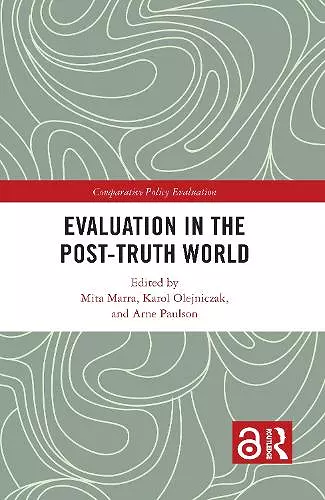Evaluation in the Post-Truth World
Mita Marra editor Arne Paulson editor Karol Olejniczak editor
Format:Hardback
Publisher:Taylor & Francis Ltd
Published:16th Apr '24
Currently unavailable, and unfortunately no date known when it will be back

Evaluation in the Post-Truth World explores the relationship between the nature of evaluative knowledge, the increasing demand in decision-making for evaluation and other forms of research evidence, and the post-truth phenomena of antiscience sentiments combined with illiberal tendencies of the present day. Rather than offer a checklist on how to deal with post-truth, the experts found herein wish to raise awareness and reflection throughout policy circles on the factors that influence our assessment and policy-related work in such a challenging environment. Journeying alongside the editor and contributors, readers benefit from three guiding questions to help identify specific challenges but tools to deal with such challenges: How are policy problems conceptualized in the current political climate? What is the relationship between expertise and decision-making in today’s political circumstances? How complex has evaluation become as a social practice?
Evaluation in the Post-Truth World will benefit evaluation practitioners at the program and project levels, as well as policy analysts and scholars interested in applications of evaluation in the public policy domain.
Chapters 6, and 11 of this book are freely available as a downloadable Open Access PDF at http://www.taylorfrancis.com under a Creative Commons [Attribution-Non Commercial-No Derivatives (CC-BY-NC-ND)] 4.0 license.
This book profoundly faces the tension between social science/evaluation and the world of lies, distortions, and un-truths. Whether addressing Brexit or Trump, this book does not shy away from the confrontation of these two forces playing out in countries across the globe. As the editors see it, we are now in the midst of "the death of expertise" as emotions lure people and politicians more than facts and evidence do. One of the brilliantly addressed tensions in the book is that between knowledge and power. The tensions are manageable, especially if there are safeguards erected by democratic institutions. But when these safeguards are challenged or eroded, as in the times we are presently experiencing, democracy becomes more fragile and frail. The ten chapters in this volume focus on democratic countries and their public policy decision-making for two reasons: First, the democratic environment is the most common arena for the evaluative function; and second, the post-truth phenomenon is most visible in the democratic space.
Ray C. Rist, Former Senior Advisor (Retired), The World Bank
Like many others, I have been puzzled by the increasing tension between the discrediting of science and expertise on the one hand, and the pressure for evidence-based policymaking, on the other hand. This tension is the focus of this book, which has been initiated and written during the last turbulent years with Trump, COVID and the Ukraine war. The aim of the book is to raise awareness and provoke reflections on the factors that influence evaluations and policy-related work in such challenging environments. The first part deals with the relationship between policy problems and evaluation, the second with the relationship between politics and expertise, and the third with the complexity of evaluation in the institutional and political systems. The underlying conviction is that for an evaluating society to flourish, citizens and professionals have to develop a capacity to be inquisitive, systematic in their inquiry, judicious in their claims, truth seeking, analytical, intellectually humble, sympathetic to opposing points of view, self-critical, and open-minded— not simply open-minded in the sense of being tolerant of other points of view, but open-minded in the sense of recognizing the challenges to one’s own way of seeing things that arise from others’ ways of making distinctions of worth.
Per Oyvind Bastøe, International Evaluation Adviser, Formerly Evaluation Director and Chair of OECD/DAC Evaluation Network
ISBN: 9781032719313
Dimensions: unknown
Weight: 453g
210 pages